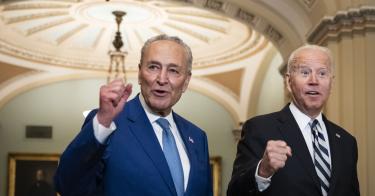July is normally the time of year for vacations and barbecues. Yet instead of grilling steaks or hot dogs, Congress is preparing to send America’s economic recovery up in flames.
This week, the Senate will begin a series of votes on a $1.2 trillion infrastructure package that includes highways, mass transit, airports, intercity rail, and more.
Although the infrastructure deal has many flaws, those problems pale in comparison to what is likely to follow, which is the single largest tax-and-spend bill in the nation’s history. This would build a cradle-to-grave welfare state paid for by destructive tax hikes.
Under normal circumstances, infrastructure would have nothing to do with social programs. But these are not normal times. Democrats have spent the year attempting to use the word “infrastructure” as a shield for agenda items that have nothing to do with roads and bridges.
Now, top Democrats like Sen. Majority Leader Chuck Schumer, D-N.Y., and House Speaker Nancy Pelosi, D-Calif., are demanding that the infrastructure bill only move forward in conjunction with a big-spending bill full of liberal priorities that utilizes a procedure known as reconciliation, which would allow it to pass the Senate on party lines.
To get to reconciliation, they must first pass a budget resolution for the upcoming fiscal year. A budget agreement between Democrats on the Senate Budget Committee revealed that they will seek a gargantuan $3.5 trillion in new spending. The budget agreement will seek to expand several government programs.
First, the budget agreement would create the largest expansion of welfare benefits since the 1960s, which would promote dependency on government and discourage work. This would go even further than the negative effects of excessive unemployment benefits on the economy.
Second, the budget agreement would include a slew of programs linked to the Green New Deal, which would provide huge amounts of corporate welfare to favored industries while generating minimal environmental benefits.
Third, the budget agreement would expand existing health programs like Medicare, moving America closer to government-run healthcare and reducing consumer choices and medical innovation.
Fourth, it would likely include massive amnesty for illegal immigrants, which would encourage new waves of illegal border crossings and violate core aspects of budget reconciliation.
This vision, centralizing power in Washington, D.C. through a command-and-control economy and an endless array of federal benefit programs, is bad enough.
The destructive tax hikes that would accompany the spending would make things worse. The tax hikes would kneecap the economic recovery by discouraging private investment, which is the wellspring of job creation and economic growth.
In addition, Democrats hope to use the concept of “dynamic scoring” to reduce the number of tax increases needed to pay for the spending. The theory is that federal policy can lead to new economic activity and bring in additional tax revenue.
However, this only works if the legislation actually grows the economy. Combining anti-work welfare benefits with anti-investment tax hikes would do precisely the opposite, meaning lower revenues and that add to the national debt.
The Congressional Budget Office has already shown that large spending increases financed by tax hikes shrink the economy, lower wages, and reduce overall investment. Similarly, experts from The Heritage Foundation have demonstrated that infrastructure spending is not a reliable way to grow the economy, and that overall spending fails to deliver on promised growth effects.
All this spending—$1.2 trillion on infrastructure, $3.5 trillion on climate and welfare—is not taking place in isolation. Adding in the deeply flawed $1.9 trillion package that passed in March, the grand total comes to $6.6 trillion of new spending passed in a single year.
To put it another way, that would cost every household in the country about $51,000.
Beyond problems of wasteful and counterproductive spending, inflation is another factor that can further damage the economy.
The federal government pumped trillions into the economy in 2020 and trillions more in 2021. Excessive amounts of stimulus have not yet caused the type of hyperinflation that caused turmoil in the 1970s.
However, extending the spending spree further could quickly push inflation over the brink.
By marrying the radical reconciliation package to the bipartisan infrastructure deal, and rushing infrastructure to the Senate floor before it has even been written, Schumer is causing many Republicans to second-guess their support for the infrastructure deal.
A factor behind this wavering support is the way that the reconciliation package undermines the basics of political compromise.
Negotiations about infrastructure have been occurring for months, which is fully justified given the amount Democrats want to spend. Yet if Democrats can use reconciliation to obtain nearly everything they don’t get through the infrastructure bill, that turns negotiations into a heads-I-win, tails-you-lose proposition.
Votes on infrastructure should not be tied to a spending package that would push America toward the stagnation of New York and the misery of Cuba.
Instead of rushing half-baked legislation to votes for the sake of an arbitrary goal of completing infrastructure work in July, legislators should commit to the open deliberative process that major legislation deserves.
In addition, rather than attempting to force a one-sized-fits-all federal approach on the country, Congress should cut red tape and empower the private sector and state governments to improve the nation’s infrastructure.
That would help the economy keep cooking without the danger of overheating.
This piece originally appeared in The Daily Signal



